
 Crowdfunding books can be a tricky business.
Crowdfunding books can be a tricky business.
To get the insider's view on the process, we asked veteran Unbound author Stevyn Colgan and first-timer Niall Slater to share their experiences.
NS: So you’ve just reached 100% funding with a darkly comic murder mystery – your first novel, and your fourth book to be published through Unbound. It’s got a blurb from Stephen Fry and a number of big-name supporters, so from the outside it looks like you’ve run an excellent campaign. Do you feel like you’ve got the hang of crowdfunding?
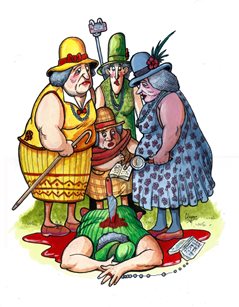 SC: I'm not sure if I've got the hang of it quite yet! Four books later and it's still very hard work, although I'm certainly more aware now of what works and what doesn't work when you're angling to get pledges. I suspect that several other, weightier factors are at work here: firstly, potential investors are much more informed about crowdfunding now than when I started. When I ran my first campaign I probably spent 50% of my time explaining to people what crowdfunding is and how it works.
SC: I'm not sure if I've got the hang of it quite yet! Four books later and it's still very hard work, although I'm certainly more aware now of what works and what doesn't work when you're angling to get pledges. I suspect that several other, weightier factors are at work here: firstly, potential investors are much more informed about crowdfunding now than when I started. When I ran my first campaign I probably spent 50% of my time explaining to people what crowdfunding is and how it works.
Secondly, people are getting used to the idea of having to wait for the book they've put money into. It's a very 'buy now, pay less, deliver tomorrow', instant gratification marketplace these days and the idea of having to wait doesn't sit well with many people. But now that they've seen the quality of the books being produced - both in content and design/appearance/fabrication - my subscribers do seem less impatient, even if the wait for their book can often be over a year long.
I've published four books with Unbound and they're just celebrating five years as a publisher. They're still a new kid on the block and there's room for improvement, but the system is working and getting more mainstream every day.
Traditional publishers used to take risks all the time.
NS: You raise an interesting point about audiences. You say your subscribers are happy to wait for the product, confident that they’re going to enjoy it when it comes. I suppose that’s because you’ve become somewhat established over four projects, right? Publishers often rely on repeat customers, asking authors to produce a product similar to what’s come before (Joanne Harris spoke recently on the Bestseller Experiment podcast about the pressure to repeat past successes), but you’ve managed to fund two books of curiously-connected facts, one about your 30 years as a policeman, one with Sue Black on WWII codebreakers, and now a murder mystery which a traditional publisher might not have gambled on. You seem to have cultivated an audience who are happy to travel across genres with you – do you think this suggests traditional publishers should take those risks?
SC: Traditional publishers used to take risks all the time. But that was in the days when lots of people read lots of books and didn't have the distraction of hundreds of TV channels, video games and the internet. Belts have had to be tightened this last decade or so and the arrival of easily pirated ebooks and the loss of book stores hasn't helped either. Sadly, much like TV and the movie industry, publishers tend to plump for dead certs these days - books by well-known people, TV tie-ins, celeb autobiographies etc. And who can blame them? After all, it's their investment that's at risk if a book doesn't sell.
they can afford to take risks because, even
if a book bombs, the publisher doesn't take the hit...
Unbound doesn't have those pressures because the money to publish comes from public subscription; they can afford to take risks because, even if a book bombs, the publisher doesn't take the hit. That's good news for authors who would otherwise maybe not get a book deal from more risk-averse publishers, but it does also mean that there isn't always money available for a decent marketing campaign unless you build additional costs into the crowdfunding total. The traditional publisher, by contrast, will have a fully staffed publicity department and marketing budget to help promote books because it's in their interests to recoup their investment.
As for people following me across genres, I suspect that the reason for that is humour. Every book I've written, fiction or non-fiction, has a deep vein of humour running through it. Some, like A Murder To Die For (out in 2018) are all comedy. But the two fact books (Joined-Up Thinking and Constable Colgan's Connectoscope) and my policing memoir (Why Did The Policeman Cross The Road?) will all raise a wry smile as you read them, I hope! People have kept coming back and subscribing, book after book, and the time it takes to raise the money has shortened considerably each time so I guess I'm doing something right.
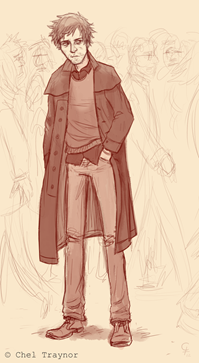 NS: I’ve been thinking a lot about publishers and risks lately. I’m halfway through funding my first book (a slightly weird semi-literary space opera) and, despite having interest from agents and being longlisted for the Bath Novel Award, it hasn’t quite managed to take off on its own. I’ve been told that space opera’s a crowded market, which is true enough, but I do wonder: what’s not a crowded market? Is there a gap in, I dunno, Archaeological Romance? Biblical Fan Fiction? Literary Car Chases?
NS: I’ve been thinking a lot about publishers and risks lately. I’m halfway through funding my first book (a slightly weird semi-literary space opera) and, despite having interest from agents and being longlisted for the Bath Novel Award, it hasn’t quite managed to take off on its own. I’ve been told that space opera’s a crowded market, which is true enough, but I do wonder: what’s not a crowded market? Is there a gap in, I dunno, Archaeological Romance? Biblical Fan Fiction? Literary Car Chases?
As a new writer, it’s hard not to feel cowed by the impression that there’s no more room. It’s great that Unbound provides a platform for us to prove ourselves, but even without a marketing budget to make up, the funding target is no small amount of money.
I’d hoped that by crowdfunding I could seek out a kind of starter audience – sci-fi fans who like complex characters as well as bar brawls, was my target – but so far it’s been a bit of a slog. I’ve found it quite draining, in a similar way to how I’ve heard other authors describe their experiences of self-publishing. Crowdfunding is selling your book not even as a product, but as the promise of a product, which is very difficult to spin! (Especially if, like me, you’re prone to self-deprecating humour, which doesn’t make for good marketing.)
I’ve found it brings out a funny side in people – I’ve had a fair bit of hatemail out of it, and I don’t think I’m the only one. I’ve heard other Unbounders talk about the strange mental toll taken by the crowdfunding process, going around and raising funds bit by bit, person by person – is this something you’ve experienced?
Crowdfunding is a slog. Unless you have
an established brand, or fan base, it's like
wading uphill through peanut butter.
SC: Oddly enough, my just-recently-funded novel A Murder To Die For was aimed at a specific gap in the market. I mentioned humour in my previous reply because mainstream comedy - particularly farce - is one of my great loves. But there's hardly anyone writing it any more. Once upon a time there were dozens of authors - Michael Frayn, David Nobbs, John Mortimer, P G Wodehouse, Stella Gibbons, Tom Sharpe, George MacDonald Fraser, Richard Gordon, H E Bates and so many more - all producing great comedy books about ordinary people involved in bizarre and hilarious situations. It was those kinds of books that migrated to film to become the great British comedy movies of the 1950s and 60s. Many spawned sitcoms and most of the best sitcoms - think Fawlty Towers, Dad's Army, Father Ted - are set in the real world but feature farcical situations and extraordinary characters.
In recent years, it seems that comedy novels have become a sub-genre; there's plenty of humour in sci-fi and fantasy with authors like Douglas Adams, Terry Pratchett, Jasper Fforde, Tom Holt, Harry Harrison etc. And there's a heap of it in, for want of a better name, women's fiction too, thanks to Helen Fielding, Sophie Kinsella, Jenny Colgan, Laura Wolf, Alice Clayton et al. But there aren’t a lot of novels about hotel owners, Irish priests or members of the Home Guard are there? That's why I specifically aimed for that gap in the market. That said, it may be that the gap is there for a good reason. Maybe no one wants to read that stuff anymore?
 Comedy is always a tricky pitch because it's so subjective. Just look at Mrs Brown's Boys, for example. Some love it, some hate it. That kind of market is hard to sell to because only a proportion of people will laugh at the same things that you do. And I'm encouraged by the fact that there are still successful comedy authors out there like John Niven, Ben Elton and Jonathan Coe, and Unbound has released comedies by Andy Hamilton, David Quantick, Laurie Avadis, Ed Higgins and Katie Brand. So I'm still going for it. There's always more room for a new book so long as it catches people’s interest.
Comedy is always a tricky pitch because it's so subjective. Just look at Mrs Brown's Boys, for example. Some love it, some hate it. That kind of market is hard to sell to because only a proportion of people will laugh at the same things that you do. And I'm encouraged by the fact that there are still successful comedy authors out there like John Niven, Ben Elton and Jonathan Coe, and Unbound has released comedies by Andy Hamilton, David Quantick, Laurie Avadis, Ed Higgins and Katie Brand. So I'm still going for it. There's always more room for a new book so long as it catches people’s interest.
And yes, crowdfunding is a slog. Unless you have an established brand, or fan base, it's like wading uphill through peanut butter. As you say, you're selling the promise of a book and you're asking people to pay for something that they may have to wait over a year for. Unbound does say that it's an old model, one that was used by Dickens and Dr Johnson, and it was. But those splendid gentlemen weren't living in times when people expected instant gratification and next day delivery. But what's the alternative?
You could run a subscription service I suppose - like a book club - where you ask the public to pay, say, a tenner a month, and then every couple of months they can choose a book from the catalogue. With enough subscribers, there would be a pool of money to fund books without the authors having to work so damned hard on crowdfunding. But you would need a very healthy subscriber list for that to work. And, I suspect, Unbound wouldn't be able to put out so many books. Additionally there would, sadly, be some authors whose books don't get chosen often.
It's never been easier to get published.
But it's never been harder to get noticed.
At least with the existing model your book gets out there. So I guess we're stuck with it for the moment. I'm sorry to see that you've had hate mail. I've had some snippy replies to emails and requests to stop 'begging'. And I've had a couple of tweeters telling me where to go (it wasn't somewhere nice). But authors have always had to have thick skins; I was talking to some new writers today and revealed that I was rejected 47 times before I got my first book deal with Pan Macmillan. So the occasionally shitty tweet or trolling is just a different flavour of rejection. You have to accept it and move on.
NS: It comes with the territory, I suppose. You need thick skin to write a book in the first place, and I’m learning that a certain leatheriness of ego comes in handy later on, too. (That and being able to schedule tweets. Thank you, Tweetdeck.)
A subscription service does sound interesting. There’s been a lot of discussion at SoA meetings lately about future forms of publishing – completely new ideas as well as reworked versions of old ones. Game and app developers are coming up with some bizarre new funding models, and I’d like to see more co-operation between industries to see if methods that work in one place might also work in another.
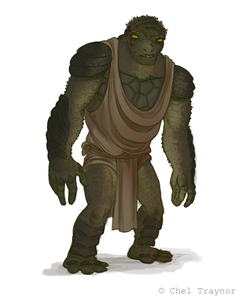 Take platforms like Humble. They’ve been packaging books with similarly-themed games and apps, and they’ve seen some amazing successes. Packages available for a penny on a pay-what-you-want basis see average sale prices of £10-15, and sales figures in the tens of thousands. Top pledgers often drop hundreds or even thousands of pounds to show their support. It’s hard to say how good these deals end up being for the author, but it’s certainly breaking interesting ground.
Take platforms like Humble. They’ve been packaging books with similarly-themed games and apps, and they’ve seen some amazing successes. Packages available for a penny on a pay-what-you-want basis see average sale prices of £10-15, and sales figures in the tens of thousands. Top pledgers often drop hundreds or even thousands of pounds to show their support. It’s hard to say how good these deals end up being for the author, but it’s certainly breaking interesting ground.
Imagine Tinder for book pitches, where readers offer some set amount a month (like Flattr) and swipe right on books they’d like to read, distributing the monthly pot between them. What else? Er- Snapchat for poems? You can get them for free, but they only last ten seconds? (I’ll go back to the drawing board.)
As someone still clawing their way past the 50% mark, I’m most curious about what it’s like after a crowdfunding campaign works out. You’ve had cracking reviews on all your books and every Unbound book earns out its advance immediately (sort of – they don’t do advances but the costs of publication are covered), but how do crowdfunded books do once they’re out the door? And have you had any thoughts on what’s next for you?
SC: We definitely need to explore new ways to bring books and readers together. The days when readers would discover a new book or writer by browsing in a book shop (same thing with listeners in record shops) seem to be a thing of the past with more and more people buying online. People don't browse sites like Amazon; they tend to already know what they're going to buy when they visit. So yes, new forms of promotion and new ways to buy books would be great. It may even be that the formats of books have to change too. People are more reluctant readers now than they were in my generation and they have a great many more distractions.
I've read a couple of interesting papers recently that seem to suggest that people reading from screens absorb less than they do from paper (there's a feature here for example) and it's interesting that around a fifth of the Top 20 bestselling ebooks on Amazon are very short books of 100 pages or so. That would be a very thin physical book, about the width of your little figure and around 20,000 words. And many people that I've spoken to say that the only time they get (or put aside when not watching TV or playing video games) for reading these days is when commuting, at bedtime or in the loo, so it could be that short ebooks or episodic works - like TV series or podcasts - are the future for average readers. Old curmudgeons like me will have to binge on 'boxsets' to read a whole novel.
It's never been easier to get published. But it's never been harder to get noticed. Non-traditional (i.e. crowdfunding, self-publishing etc.) publishing's biggest challenge is marketing. Bloomsbury can afford to spend hundreds of thousands on posters on public transport, magazine ads and TV spots for the next J.K. Rowling because they can be sure that they'll get a huge return on their money. But, for the rest of us, we have to find other, cheaper ways to get promoted. Media exposure helps immensely. You can get yourself a blog or vlog or podcast or be interviewed for other people's blogs, vlogs and podcasts. You can speak at live events. A friend of mine, Dr. David Bramwell, had his new book The Odditorium mentioned on the Chris Evans radio show once and it went straight to the Amazon Top 10.
those days are gone and we can't sit around pulling out our hair and bemoaning their loss.
Okay, so national radio isn't always possible, but local and regional radio are generally open to approaches from authors. Just make sure you have something interesting to talk about beyond your book, and find some way to relate it to current affairs. Just recently Nikesh Shukla's crowdfunded The Good Immigrant has caught the zeitgeist of Brexit and Trumpmania brilliantly and, as a result, has scored some great TV and radio spots.
As a 21st century author you have to be flexible and agile. You have to explore any and every option available to you. My first book took the traditional route via my agent and an established publisher. My second was a small press imprint. I've done four crowdfunded books and I have two books self-published on Lulu. As for the future, who knows?
A Murder To Die For is 100% funded but, even as I'm gearing up to get it edited, designed and published with Unbound, my agent is out there doing his job and looking for the next book deal. He may succeed. He may not. Or I may crowdfund again. Or self-publish again. But, whatever happens, I'll do what I can to get my books into people's hands. I'm also turning several of my ideas into screenplays and looking at pitching them to production companies both online and TV. That may also be a way forward and it means that I'm still getting to write.
When I was a kid there were no mobile phones, no computers and just three TV channels. The libraries were full of people and there were book shops on every High Street. But those days are gone and we can't sit around pulling out our hair and bemoaning their loss. The world has moved on and things aren't going to revert. It's true that most authors no longer get decent advances and publishers don't take the risks that they used to. But that doesn't mean that authors are impotent. It just means that we have to find new ways to be seen and heard.
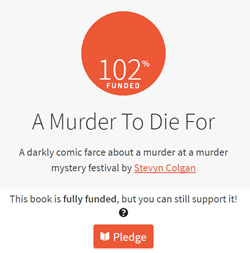 Stevyn Colgan's A Murder To Die For is a darkly comic farce coming 2018 from Unbound.
Stevyn Colgan's A Murder To Die For is a darkly comic farce coming 2018 from Unbound.
Every year, fans from all over the world descend upon a tiny picturesque English village to celebrate the life of the enigmatic author Agnes Crabbe and her fictional lady detective, Miss Millicent Cutter.
Crabbe fans are quite obsessive; the majority turn up to the festival dressed as Miss Cutter. Spats between rival fan clubs are not uncommon. But when one of the most prominent superfans is murdered on the first day of the festival, the police find themselves trying to solve a crime in which the victim, witnesses, almost everyone in the village, and even the murderer, are all dressed as Miss Cutter. And most of them are also trying to solve the murder.
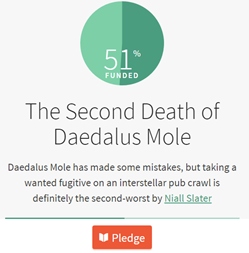
Niall Slater's The Second Death of Daedalus Mole is a space opera currently crowdfunding with Unbound.
Daedalus Mole wants to make the best of a bad situation. The plan: fly his unwanted passenger, Erin, to her destination, squeeze her for every last penny, then immediately find refuge in the nearest pub.
Unfortunately, when the galaxy is on the verge of economic collapse and your passenger has a bounty the size of a planet on her head, there’s only so much another drink can do to help.
llustrations (right-hand side) by Chel Traynor.Illustration (left-hand side) by TokyoSexWhale.